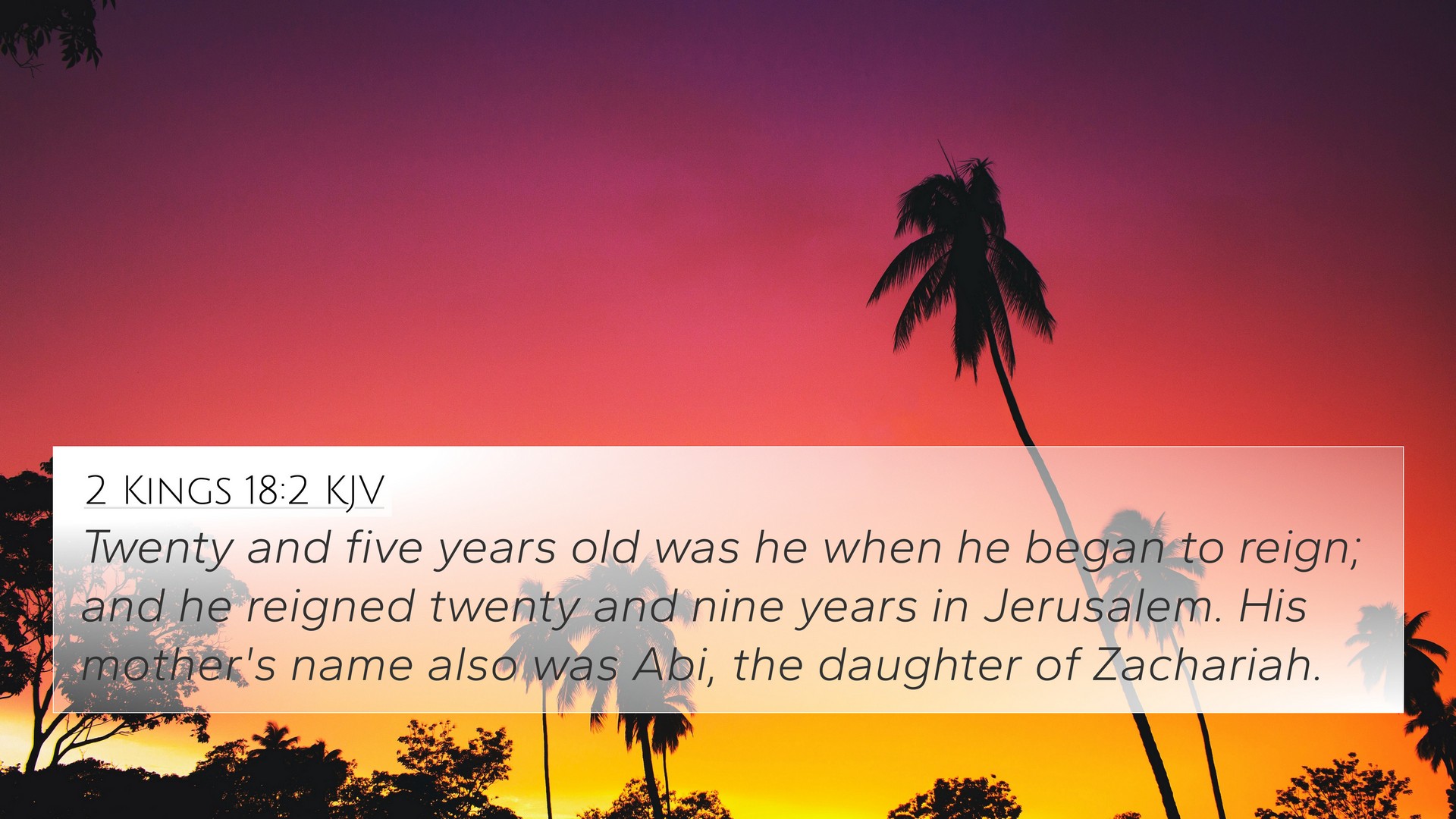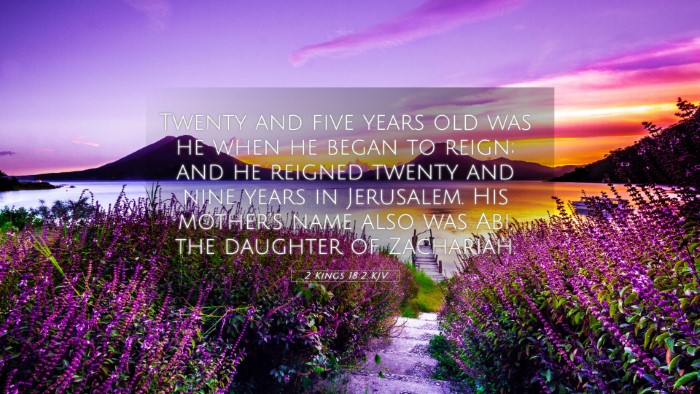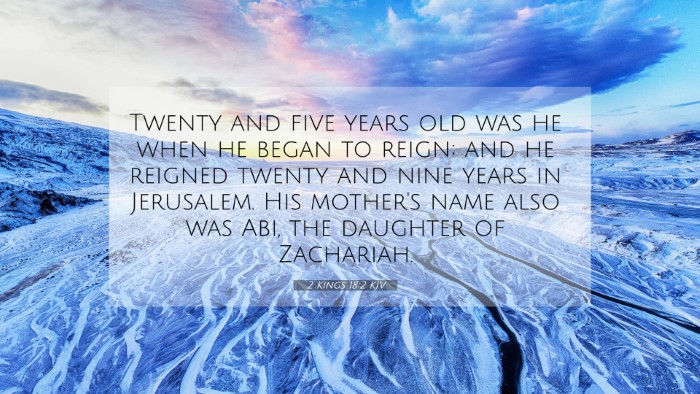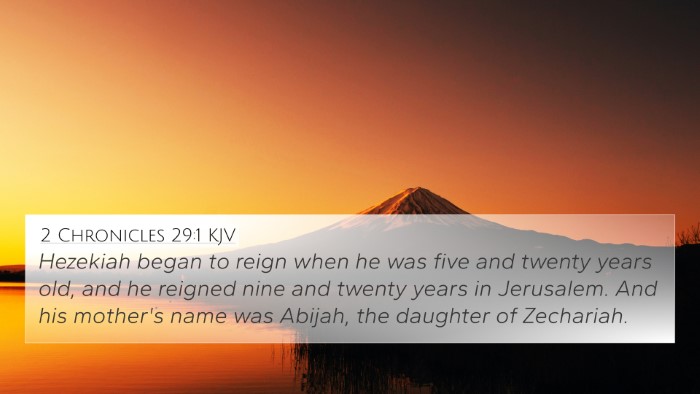Understanding 2 Kings 18:2
In 2 Kings 18:2, we find an essential moment in the history of Israel, as it introduces the reign of King Hezekiah. The verse states:
“He was twenty-five years old when he began to reign; and he reigned twenty-nine years in Jerusalem. His mother’s name was Abi, the daughter of Zechariah.”
Summary of Verses Meaning
This verse serves as an introduction to a pivotal monarch in Judah's history, emphasizing both his age and the duration of his reign. The mention of his mother's name connects personal lineage to royal authority in the context of biblical narrative.
Insights from Commentaries
- Matthew Henry: Henry notes that Hezekiah’s age, being 25 at the start of his reign, was rather young for such an important position, yet it emphasizes that God can use anyone regardless of age. His mother's influence is also underlined, suggesting that maternal guidance plays a role in shaping leaders.
- Albert Barnes: Barnes highlights the significance of Hezekiah not only as a king but as a reformer. His reign was marked by a return to Yahweh worship and a rejection of idolatry, situations drawn partly from the background he inherited, including his mother’s lineage and beliefs.
- Adam Clarke: Clarke provides context regarding Hezekiah's mother, Abi, stating that she may have played a crucial role in instilling faith and values in her son, which were essential for his successful reign. Hezekiah is recognized for his faithfulness to God, contrasting with his father's disobedience.
Connecting Verses and Themes
For further understanding of 2 Kings 18:2, we can explore several other scripture passages that relate to Hezekiah's leadership and reforms:
- 2 Chronicles 29:1-2: This passage elaborates on Hezekiah’s initiatives to restore temple worship, aiming towards spiritual revival.
- Isaiah 36-39: These chapters detail the interactions between Hezekiah and Assyrian forces, showcasing his faith and reliance on God during crises.
- 2 Kings 18:4: Here, Hezekiah is noted for destroying idols and restoring proper worship, mirroring his commitment to spiritual reform.
- 2 Kings 20:5: Reflects on Hezekiah’s humility and prayer life, crucial for understanding his character as a king dedicated to God.
- Psalm 46:1-3: Presents a theme of God as refuge, which resonates with Hezekiah's pleas for divine assistance during his reign.
- Micah 1:1: Indicates the prophetic context during Hezekiah’s reign, drawing connections between the prophetic and royal responsibilities.
- Jeremiah 26:18: Reflects on the challenges that Hezekiah faced in maintaining prophetic truth amidst national struggles.
Thematic Connections
From a thematic perspective, 2 Kings 18:2 intersects with various themes:
- Leadership and Age: The uncommon youthfulness of Hezekiah as king invites discussions on leadership capabilities beyond age.
- Maternal Influence: The mention of his mother's name resonates with the idea of family lineage impacting a leader’s values and actions.
- Reformation and Idolatry: Hezekiah’s actions signify a larger biblical theme concerning the need for returning to true worship.
- Divine Sovereignty: The historical backdrop serves to illustrate God’s control over the affairs of nations and individuals.
Cross-Referencing Insights
To develop a deep understanding of 2 Kings 18:2, employing cross-referencing can be beneficial:
- Tools for Bible cross-referencing: Utilizing a Bible concordance can effectively highlight connections between verses.
- Cross-reference Bible study: Engage in comparative Bible verse analysis to uncover deeper meanings.
- Identifying connections between Old and New Testament: Hezekiah’s story reflects truths that inform the New Testament believers.
Conclusion
In conclusion, 2 Kings 18:2 serves as a critical launching point for understanding the character and reign of King Hezekiah. Through the insights provided by public domain commentaries and scriptures, one can draw rich parallels and thematic connections throughout the Bible. These reflections not only help in understanding this particular verse but also enhance one’s knowledge of broader biblical narratives and themes.



